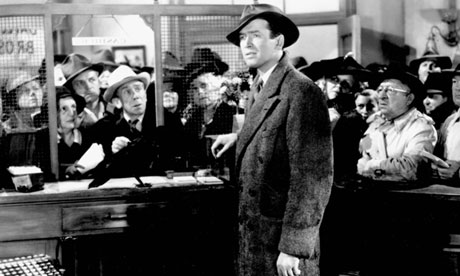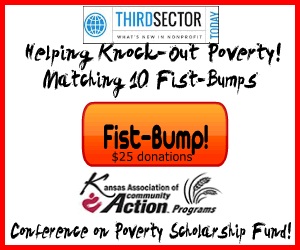
image: theguardian.com
Who’s a George Bailey? Uncle Billy? Mr. Potter?
The ubiquitous holiday classic “It’s a Wonderful Life” (IAWL) illustrates the twists and turns of fate that could make a nonprofit administrator’s hair turn as white as Mr. Potter’s.
Jack Marshall, who is a lawyer, ethicist and theater founder, says the film is full of ethics lessons. There are so many dilemmas, in fact, Marshall combines three of his past Ethics Alarm pieces on the movie into a compendium.
IAWL provides much to mine—for anyone, for everyman—but has some warnings for nonprofit managers. The now archetypal characters in the film teach us lessons related to mission, management, fiscal responsibility, and decision-making.
Jimmy Stewart’s George Bailey initially sets some goals and takes strategic steps to “shake the dust of this crummy little town off my feet and see the world.” He figures he can have some life-informing adventures before entering college to study architecture. Fate throws George some curves—falling in love the least of his problems. The plan flies out the window as fast as you can say “Bailey Brothers Building and Loan.” That family business seems to run more like a nonprofit than a business as the heartless Mr. Potter is quick to point out.
George is not the only one with problems. His right hand associate Uncle Billy has financial responsibility, but drinks a bit and tends to lose things. Residents of the Bailey housing development often can’t pay their mortgages.
At many junctures, George has to choose which road to follow in his life journey. The road not taken haunts him and he eventually loses hope. Mr. Potter might say George didn’t have a sound strategic plan. Like many nonprofits, George has a lot of heart but lacks the financial resources and infrastructure to reach the next level.
Ultimately many of the choices and dilemmas in Frank Capra’s classic film are ethics-driven, from George telling pharmacist Gower that he might have accidentally poisoned a customer to Mr. Potter taking the cash Uncle Billy misplaces on his bank deposit trip.
Marshall’s insight on the film is beneficial as he digs into the layers of what really resonates when we watch IAWL. Doesn’t the value of ethical decisions outweigh risk and heartache? Aren’t sound fiscal decisions at the core of successful organizations that realistically set realistic, fundable goals? And isn’t adherence to mission a mantra to cherish? Take another road and resources may be diluted, goals missed , and capacity threatened.
Jack Marshall’s Ethics Alarm site is indeed full of ethical dilemmas.
A life re-do? Here’s a discussion about what you might do if you had it do all again—as in George Bailey getting his wish.
Yvonne Hudson, principal of New Place Collaborations in Pittsburgh, shares her hometown of Indiana, Pennsylvania, with actor James Stewart. Indiana can seem a lot like Bedford Falls—and that’s a good thing!









